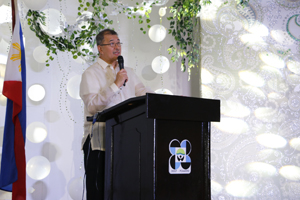
Responding to this concern in a keynote message, Secretary Fortunato P. dela Peña of the Department of Science and Technology (DOST), persuaded the National Agriculture and Aquatic Resources Research and Development Network (NAARRDN) to muster its best effort in ensuring the most productive research and development activities towards attaining food security.
This was during the 6th Anniversary Celebration of the Philippine Council for Agriculture, Aquatic and Natural Resources Research and Development (PCAARRD), one of the sectoral councils of the DOST on June 27-30, 2017.
“Food security, which is by far the most challenging task facing the Philippines, can best be addressed through collaborative research and development efforts, the right priorities, and the best strategies,” the DOST Secretary pointed out.
Anchored on PCAARRD’s anniversary theme, “Responsive S&T to Secure Food for The People and Progress to the Nation,” dela Peña stressed certain concerns and priorities through which PCAARRD and its allied agencies could truly be responsive in terms of attaining food security and progress.
Dela Peña inspired the NAARRDN to optimize its gains by adapting to the challenges brought about by climate change and a seemingly changing hostile environment caused by erosion, flooding, and drought, among other agricultural travails.
The Secretary also challenged the NAARRDN to strengthen its information and communication technology-enabled services to provide quickly the country’s farming communities with scientific knowledge that will increase their productivity and income.
Dela Peña underscored as well the need to create a huge appreciation in agriculture and fisheries-related courses among students, especially those in the primary and secondary levels. This is to encourage them to join the agri-aqua industry and be responsible in supporting the country’s growing demand for food. Along this line, he recognized the importance of the forum Student-Teacher Agri-Aqua Ambassadors for Innovation and Livelihood or STAIL, which formed part of the anniversary celebration.
Finally, the Secretary challenged the NAARRDN to rally behind the government’s resolve to effect the delivery of science initiative in the regions, especially where food production needs to be improved, where industry needs to grow, and where innovation needs to be developed.
“Stronger R&D must be situated in the country’s poorest regions, so that the ordinary citizens can feel the services of the government,” dela Peña concluded.
